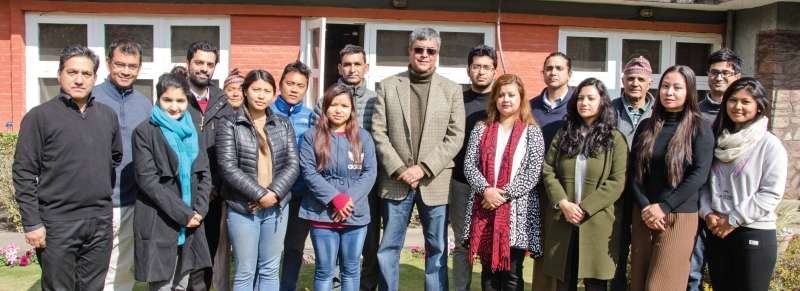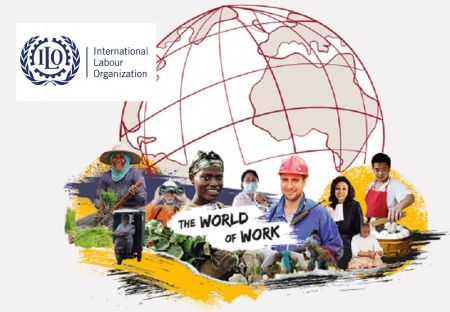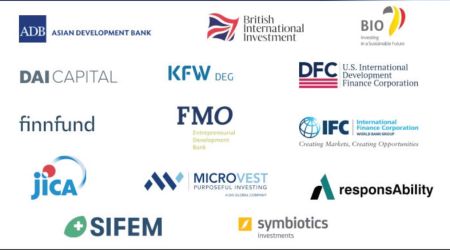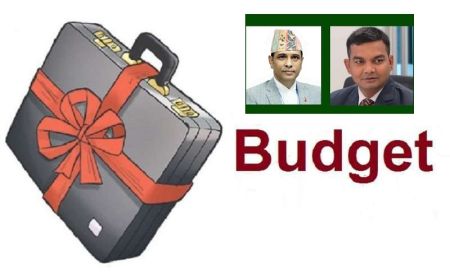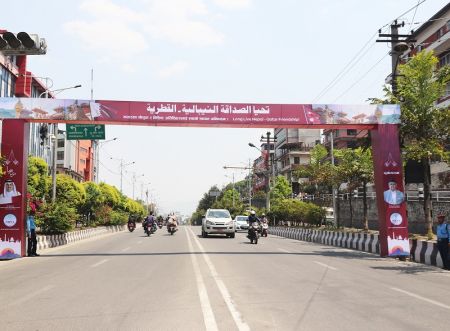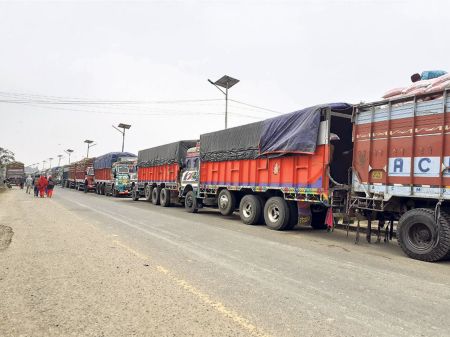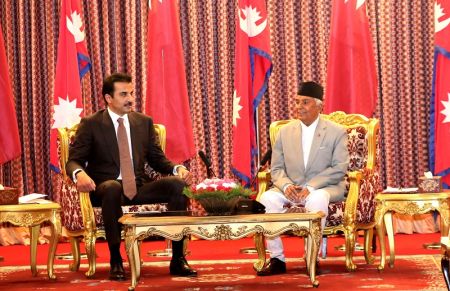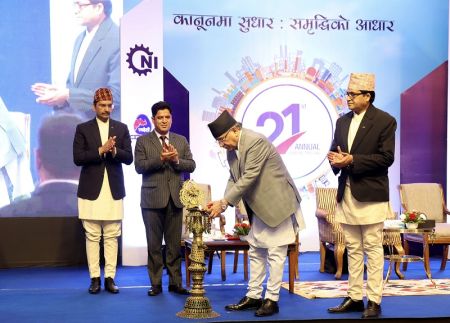By making sure that projects get done, VRock aims to become a truly unbiased, professional and evidence-based implementation outfit for Nepal.
--BY SABIN JUNG PANDE
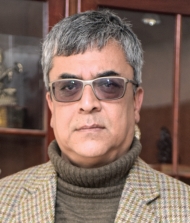 Radhesh Pant
Radhesh Pant
Co-founder and Senior Managing Partner, VRock & Company
Realising that failures in the realm of projects have numerous implications for a country like Nepal with poor infrastructures, Radhesh Pant, Satish Joshi, Ashish Bhattarai and Ajaya Shrestha co-founded VRock & Company in January 2017 starting as a consulting and advisory firm in the field of infrastructure development, financial services, strategy, management and leadership. With VRock, Radhesh Pant, a renowned banker who recently left the IBN or the Investment Board of Nepal (the high level government agency entrusted to facilitate investments), is now set for a different journey together with a team that has a wide range of experiences in successfully implementing projects.
“Having worked with the public, private and development sector and governments led by different parties on numerous occasions, we understand there is a huge gap in executing projects. VRock will strive to make projects happen and be a part of the implementation process. We want to be able to make meaningful changes in the existing laws and policies, particularly in infrastructure development and hydropower sector to unlock opportunities,” explains Pant, who is the Senior Managing Partner at VRock & Company.
VRock, as Pant explains, is distinct for its exclusive focus on the implementation of projects and is not just limited to writing, submitting and graphically presenting reports. It aims to work beyond the usual paper-pushing practices. The company focuses on becoming a part and parcel of projects, a professional unit that can advise the government, investors, private sector, development sector and bilateral and multilateral agencies on how they should move ahead with implementing projects and become part of their strategy.
Business Experience
VRock’s determination is evident in its work. One significant work was its role in the parliamentary endorsement of the Electricity Regulatory Commission (ERC) Bill in August 2017 that paved the way to form a regulatory body to oversee the companies engaged in the generation, distribution, transmission and trading of electricity.
“VRock educated and consulted with a number of lawmakers, politicians, ministers and bureaucrats on the significance of the ERC Bill and helped the government review the Bill from the perspective of best international practices and the need to suit the local legislative ecosystem,” informs Pant. According to him, the electricity market can potentially amount to billions of dollars but it won’t be realised unless there is a regulatory board like ERC guaranteeing a fair regulatory process and a level playing field.
VRock is currently engaged at the municipal level which it believes is ripe with economic opportunities. “We are consulting seven municipalities at seven provinces to make them independent and financially sustainable in the next four years,” shares Pant.
VRock is working on capacity enhancement of the seven municipalities in terms of raising their own capital and maximising gains from the available resources without being reliant on the central government. “The current local units have different requirements and capacity for infrastructures. But how they can go about is the key question. One option could be integrating a Public Private Partnership (PPP) model. We are helping them to design projects,”mentions Pant.
This is where the expertise of VRock comes in handy to fill such void. In doing so, VRock plans to make the seven municipalities competent enough to exercise the authority endowed to them by the Constitution to act independently in handling taxation, accounting and public finance and in identification, negotiation and implementation of projects for revenue generation.
“Apart from these, we are also supporting the government to operationalise the Power Trade Agreement with India,” says Pant.
At the private sector level, VRock has recently signed an interesting project with Buddha Air. Both companies are working together to formulate a framework to identify different tourist infrastructures needed in Pokhara, its vicinity and essentially in Province No. 4 after the Pokhara Regional International Airport is built. “The idea is to attract 2.5 million tourists in the next 10 years after the airport is constructed,” explains Pant. Within this collaboration, VRock will also explore opportunities that will ensure equitable gains for the locals.
Bridging Gaps, Realising Projects
VRock’s primary focus is in executing projects by solving complex challenges and delivering managerial, financial and technical prowess to projects. “We understand that projects don’t materialise with the mere signing of contracts or MoUs. There is a huge gap in the understanding about bringing in the investment among a number of private sector players and the government,” shares Pant, adding,“Commitments don’t translate into actual investments due to a number of factors. We want to help the private sector and the investors to resolve their issues with the bureaucracy, political sphere and the locals.”
In Nepal, projects require a lot of work at the grass root level in rural and remote regions. Pant views that for any project to be successful, its stakeholders, primarily local stakeholders, should be convinced and satisfied. “Locals’ interests should be the focal point of the project. They should know what exactly that project means for them and how it will create rewarding jobs and better lives,” he elaborates. According to him, the government needs to ensure acceptable returns for the private sector and that the gains of the project actually translate into benefits for Nepal, whether through using local inputs or by creating rewarding employment opportunities.
VRock also aims to work with the political leadership and make them understand how projects will benefit Nepal. To do that, one should be neutral and that is what VRock is. “We are independent professionals with national and international experiences, unbiased in our work and seek to offer the right insight and right advice to the political leadership, the government, the private sector and the development partners with a view of maximising Nepal’s gains,” says Pant.
Mitigating Challenges with Practical Solutions
There are a number of reasons why projects don’t go forward. Firstly, it is difficult to convince bureaucrats and lawmakers who aren’t fully aware about the risks, costs, benefits and constraints associated with projects. That gives space for mistrust and lack of confidence. Secondly, a lot of reshuffling happens, weakening institutional memory. Thirdly, there is a tendency to stick with business as usual processes relentlessly rather than resolving issues, amending policies to do so and coming up with solutions.
“Making projects happen is a highly challenging task but there are always practical solutions,” believes Pant. “What we have learnt is at the end of the day, if the people are told the truth, it will be easier for things to happen.Once issues are crystallized, people will start listening to you and look out for solutions,” he says.
Decision makers are always looking for expert advice and this is where VRock aims to deliver. Sharing VRock’s experiences about educating lawmakers, politicians and bureaucrats about ERC, Pant mentions that there was a lot of hesitation about ERC initially. According to him, people in the government level assumed that Ministry of Energy (MoE), Department of Electricity Development (DoED) and NEA were already fulfilling the role of ERC. “In making them understand how the electricity market will never flourish in the absence of ERC, VRock clearly showed how banks, insurance companies, stock market and telecom companies will fare poorly in the absence of their respective regulatory boards,” elucidates Pant.
The Team VRock
Comprising of 15 professionals including four partners, VRock is a highly organised team that has set priorities for its members and believes that everyone has good ideas. At VRock, the system of communication is open and there is no hierarchy as such. “All of us bring a unique expertise to the table useful for executing projects and have a deep interest in making a difference in Nepal,” says Pant. “In our pursuit for delivering excellent services and being innovative, VRock will always look out for young professionals who are dynamic, intelligent, team players and go-getters with high ethical standards.”
Future Plans
VRock wants to consistently work for the successful completion of large scale projects. Along this line, the firm is also looking to get into other areas like bringing in investments and fund management. “We want to be able to fetch investments, create and manage investment funds and develop sectoral expertise in the future,” Pant shares. One of their goals is to develop project banks and marry people or investors with projects. Pant says that VRock wants to go out and look for investors, bring them to the discussion table and negotiate projects for governments.
VRock also plans to work in the areas of economics and finance through which it seeks to enhance the capacity of people in managerial, technical, economic and financial aspects of projects. As there is a limited pool of knowledge and skills in both public and the private sectors, such capacities have to be developed at every level of public and private sector and bureaucracy.
In doing so, VRock seeks to forge partnerships with its clients, work together with them and share their expertise and experiences hands-on. “At present, our finance expert is working alongside the NEA staff so that we both share ownership in what we are doing and learn and improve together,” Pant informs.


